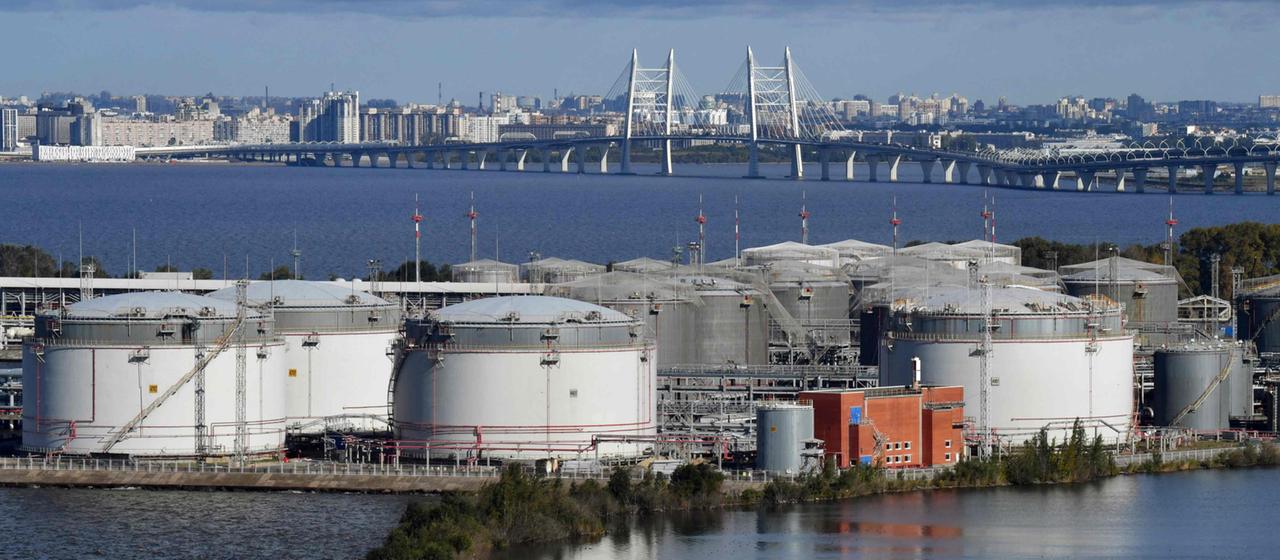
The EU member states have agreed on tougher sanctions against Russia. Plans include a ban on LNG imports starting in 2027 and measures against banks. The US has announced sanctions against Russian oil companies.
Shortly before their summit, EU member states agreed on a far-reaching tightening of sanctions against Russia. The plans include, among other things, further reducing Russia's revenues from gas and oil sales, as announced by the Danish EU Council Presidency.
To this end, a complete ban on imports of liquefied natural gas (LNG) from Russia is to come into force in 2027 – one year earlier than originally planned. Further punitive measures in the financial and trade sectors, as well as restrictions on the freedom of movement of Russian diplomats within the EU, are also planned.
Following Wednesday's agreement, the formal decision on the sanctions package is considered a formality and is to be made by written procedure by 8 a.m. The agreement was made possible by Slovakia, which lifted a reservation it had held for weeks. Slovak Prime Minister Robert Fico had previously stated that the EU had, as he had demanded, pledged to do more to combat exploding energy prices.
US government targets oil companies
It was also announced that the US government is imposing new sanctions against major Russian oil companies. In light of Kremlin leader Vladimir Putin's refusal to end the war against Ukraine, US Treasury Secretary Scott Bessent was quoted as saying in a statement that his department is imposing punitive measures against Russia's two largest oil companies. They are financing Russia's war machine.
According to the ministry, the sanctions are directed against the Russian state-owned company Rosneft – led by Igor Sechin, a close confidant of Putin – and Lukoil. Subsidiaries of the two companies in Russia are also affected.
Shortly after the sanctions were announced, US President Donald Trump also announced that he had canceled the previously promised meeting with Putin in Budapest. It didn't feel like we were getting where we needed to be, the Republican said during a meeting with NATO Secretary General Mark Rutte at the White House. However, Trump stated that there will be a meeting between him and Putin in the future.
According to Greenpeace, LNG imports are still high
The EU Commission, under the leadership of Ursula von der Leyen, proposed the sanctions package last month. She argued that Russia was financing the war in Ukraine with revenues from the sale of fossil fuels. To put an end to this, it was time to turn off the tap.
At that time, after trying to persuade Putin to enter into peace talks with Ukraine, Trump had again taken a significantly tougher stance toward Russia. He threatened to impose new, tough US sanctions on the EU if it completely renounced Russian energy.
According to a recent study published by the environmental organization Greenpeace, several billion cubic meters of Russian liquefied natural gas (LNG) were imported into the EU in the first eight months of this year alone. Only pipeline gas deliveries from Russia have declined significantly in recent years.
In its investigation, Greenpeace named the French oil company Total, the state-owned German energy company Sefe, and the Spanish company Naturgy as Russia's major LNG customers in the EU. Through their liquefied natural gas purchases, they have generated billions in corporate tax revenues for the Russian state in recent years.
Access to EU capital markets should be made more difficult
In addition to the measures on liquefied natural gas, the new sanctions package proposes to deny additional banks from Russia and friendly countries access to EU capital markets and prohibit transactions with them. Furthermore, it intends to tighten its crackdown on the use of cryptocurrencies, which are also used to circumvent existing sanctions.
In the area of trade, there will be new export bans on goods and services that can be used by the Russian defense industry or that strengthen Russian industrial capacity. These include certain chemicals and construction materials, or services related to artificial intelligence.
In addition, trade restrictions are planned against other companies from countries such as China and India that do business with Russia. In the fight against the so-called Russian shadow fleet, which circumvents energy sanctions, the listing of dozens of additional ships is planned. They will no longer be allowed to enter ports of EU member states and will also no longer be allowed to be insured, financed, or equipped by European companies.

